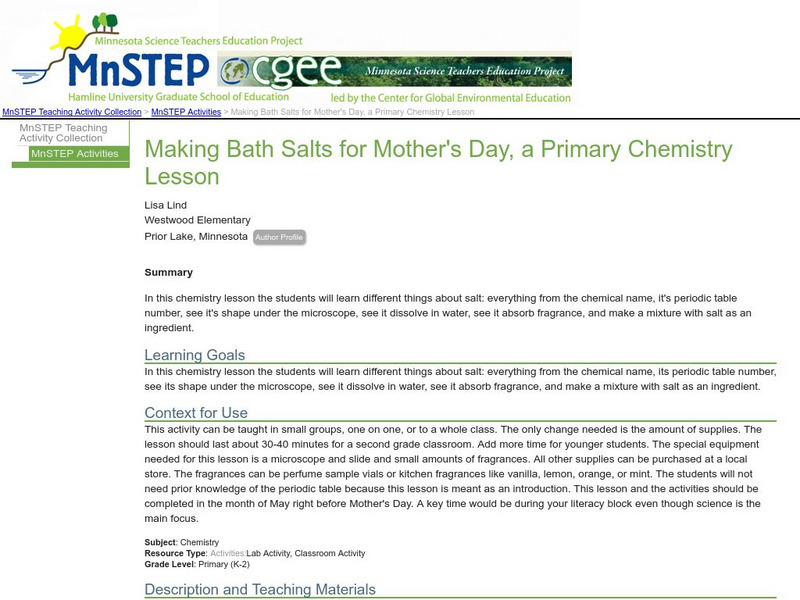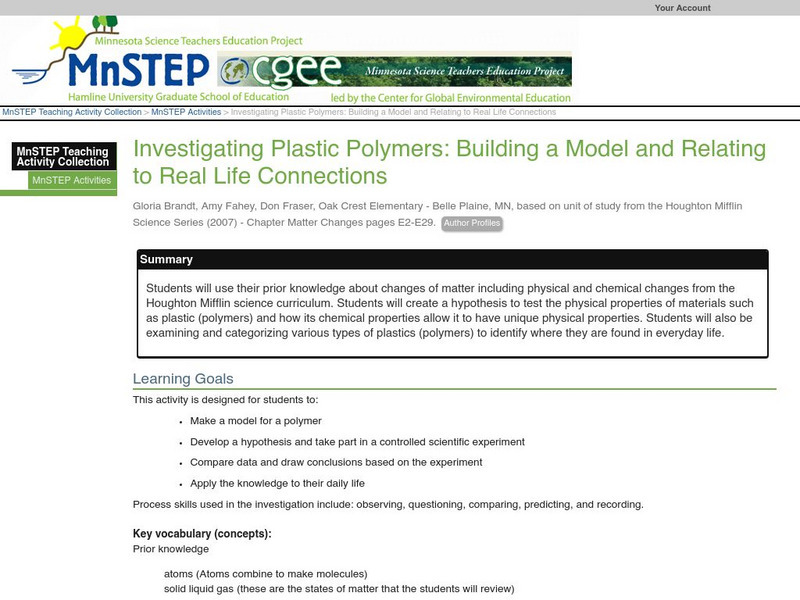Hi, what do you want to do?
BBC
Bbc: Schools: Chemistry (Single Science)
Chemistry is the study of the composition, behavior and properties of matter, and of the elements of the Earth and its atmosphere. This site provides links to chemistry exams over courses in BBC: AQA, Edexcel, Eduqas, OCR 21st Century,...
American Chemical Society
Middle School Chemistry: What Is Density?
Calculate the density of cubes made of different materials to determine what type of material it contains. Using this information explain that the size, mass, and arrangement of the atoms or molecules of a substance determines its density.
TeachEngineering
Teach Engineering: Environment
Through 10 lessons and more than 20 hands-on activities, students are introduced to the concept of an environment and the many interactions within it. As they learn about natural and human-made environments, as well as renewable and...
New York University
New York University: States of Water
Use this resource to learn about the three different phases of water; solid, liquid, and gas. What happens to water as it changes into a solid or gas? Includes short and easy to do activity.
Science Education Resource Center at Carleton College
Serc: Plastic Polymers: Investigating Their Flexibility
Young scholars will use their prior knowledge about changes of matter to develop a hypothesis to test the physical properties of materials such as plastic (polymers) and how its chemical properties allow it to have unique physical...
Other
Science Alive: Melting Point Simulation
Percy Julian and Josef Pikl used the fact that melting point-the temperature at which a substance changes from a solid to a liquid-is a characteristic property of a substance to prove that the British chemist Robert Robinson could not...
Science Education Resource Center at Carleton College
Serc: Making Bath Salts for Mother's Day, a Primary Chemistry Lesson
What do you know about salt? In this chemistry activity, students will learn different things about salt: the chemical name, it's periodic table number, it's shape under the microscope, how it dissolves in water, and how to make a...
PBS
Pbs Teachers: Make Some Zlime
Explore properties of matter by making a slimy substance out of cornstarch and water then noticing how it reacts to pressure.
Science Education Resource Center at Carleton College
Serc: Investigating Plastic Polymers: Building a Model
Learners will use their prior knowledge about changes of matter including physical and chemical changes from the Houghton Mifflin science curriculum. Students will create a hypothesis to test the physical properties of materials such as...
Texas Education Agency
Texas Gateway: Valence Shell Electron Pair Repulsion
Why does the shape of a molecule matter? Learn about how the shape of the molecule not only determines the molecule's properties but also whether it reacts or not. This tutorial reviews of VSEPR and molecular geometry.
Other
Virtual Chembook: Density Applications With Gases
DENSITY is a physical property of matter, as each element and compound has a unique density associated with it. Density defined in a qualitative manner as the measure of the relative "heaviness" of objects with a constant volume. For...
University of Texas at Austin
The University of Texas Mc Donald Observatory: Spectroscope
This activity guides students to build a spectroscope, use it as a tool, and interpret their observations by applying concepts of conservation of energy and properties of matter.














